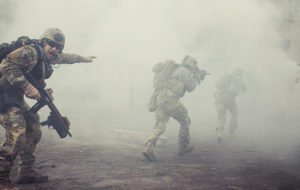Special Ops Aren’t A Substitute For Strategy

iStock.com/ Credit:zabelin
From movies to tell-all books, America loves its special operators. But a crushing pace of operations and an ever-expanding definition of what constitutes a “special operation” has spread Special Operations Forces far too thin, making it more important than ever to narrowly define SOF missions. President Joe Biden’s Interim National Security Guidance is an important step towards refocusing military policy from counterterrorism in the Middle East to strategic competition against China.
But issuing the interim guidance itself does not solve SOF’s problems. It is possible for Biden to create a smarter and more sustainable military footprint overseas, but strategic success requires adapting America’s model for counterterrorism and counterinsurgency while changing how it utilizes SOF.
Biden’s strategy for the Middle East seeks to “right-size our military presence to the level required to disrupt international terrorist networks, deter Iranian aggression, and protect other vital U.S. interests” so that America can redirect military resources toward increasingly dangerous threats like China.
After the historic shock of 9/11 attacks, counterterrorism and counterinsurgency in the Middle East became the top challenges for American defense planners. Faced with terrorists or insurgents that quickly struck civilians and then hid amongst them, America’s leaders became enamored with special operations raids and drone strikes.
The US has tried to tear itself away from the “global war on terror” before, beginning with President Obama’s “pivot to Asia” that never materialized. Then came the Trump administration’s 2018 National Defense Strategy and 2020 Irregular Warfare Annex that prioritized the Indo-Pacific. Now Biden’s strategic shift indicates that the primacy of counterterrorism and counterinsurgency within U.S. national security is ending.
However, withdrawing troops will neither end regional conflicts nor eliminate America’s exposure to terrorism. Demands for the unique capabilities SOF provide are not going to subside even as America draws down its boots-on-ground presence in the Middle East.
Going forward, it will be a challenge for the U.S. Special Operations Command (USSOCOM) to balance ongoing counterterrorism and counterinsurgency operations while also preparing to engage China and Russia in the legally and strategically murky “gray zone” between war and peace.
For much of the past two decades, special operators have functioned as an unconventional force supported by conventional forces, with SOF often in the leading role. Combat against near-peer forces would likely invert this relationship, requiring SOF to fulfill missions in support of the broader joint force, allies, and partners.
Sustainable Counterterrorism and Counterinsurgency
Even if US forces withdraw from Afghanistan or the entire Middle East, terrorists are not going away. President Biden, therefore, intends to maintain some focus on counterterrorism and counterinsurgency, even while downsizing military engagement in related conflicts. Adopting a model less focused on kinetic combat, and more focused on what’s affordable and sustainable for the long haul, will reduce the military’s role and contribute to better security outcomes. The 2018 National Strategy for Counterterrorism, which calls for “all available instruments of United States power to counter terrorism,” is a point of departure for the new administration’s own sustainable plan. SOF raids and airstrikes can garner outsized attention but also have an imperfect record of transparency. To best address the 9/11 commission’s troubling findings, the US should continue to develop its potent portfolio of non-military capabilities.
Diplomacy and National Counterterrorism Center analysis should shape counterterrorism and counterinsurgency programs, with civilian law enforcement and intelligence agencies often taking the lead. Policymakers must clearly define their priorities limiting efforts against only the terrorist groups most threatening to America, its interests, and its partners. A resource-sustainable strategy requires proactive collaboration, assigns clear roles to departments and agencies to avoid inefficient redundancy, and pushes partners and allies to take more ownership of global counterterrorism missions. Most importantly, a resource-sustainable counterterrorism model frees up ever-more Special Operations Forces to reorient against state actors and their proxies.
Adapting Special Operations Forces
Effectively countering China, Russia and other malign states requires policymakers to adapt the role of SOF. While narrowly focused counterterrorism and counterinsurgency will remain an enduring effort, SOF have not historically focused on these missions. Roger’s Rangers mastered indigenous-style raiding tactics in the Revolutionary War – what theorists today would call a “hybrid” conflict involving both guerrillas and regular forces, including Washington’s Continental Army and its French allies. President Kennedy authorized the Green Berets to counter Soviet-backed insurgencies, and one of SOF’s major Cold War roles was to prepare resistance movements in allied nations at risk of being occupied by Moscow. It was joint failures in 1980’s Iranian hostage rescue attempt and superficial success in 1983’s invasion of Grenada that built momentum behind USSOCOM’s creation — not terrorism.
Only after 9/11 did SOF become fully absorbed with “direct action” raids against terrorists and insurgents, as USSOCOM became the supported command in the global war on terror, rather than a supporting element in a primarily conventional campaign. The military services are most adept inside the box of conventional operations, but SOF core activities will be indispensable to successful future campaigns across the spectrum of conflict. Last month, lawmakers acknowledged this by creating a new sub-committee to oversee SOF.
Reducing CT activities will improve SOF capacity to compete below the level of armed conflict, respond to crises, recover kidnapped Americans, and build readiness for war in a highly contested and disordered operating environment.
To prepare for strategic competition, America needs to adapt its counterterrorism and counterinsurgency missions. SOF will be vital in operations against China and Russia while remaining crucial against enduring threats in the Middle East. Bluntly, there is no war the U.S. military can win without effective Special Operations Forces.
Lt Col Stewart “PR” Parker is a Jewish Institute for National Security of America (JINSA) 2020 U.S. Military Leaders Program participant and is currently assigned to Air Force Special Operations Command. Ari Cicurel is a Senior Policy Analyst at JINSA’s Gemunder Center for Defense and Strategy.
Originally published in Breaking Defense